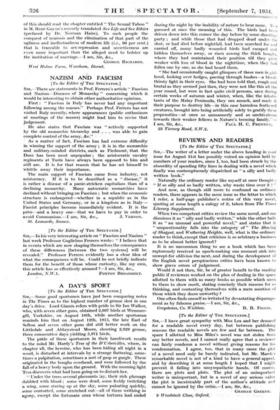A DAY'S SPORT
[To the Editor of THE SPECTATOR.] SIR,—Some good sportsmen have just been comparing notes in The Times as to the highest number of grouse shot in one day's drive. Lord Glands refers with pride to Sir Ian Walker, who, -with seven other guns, obtained 2,697 birds at Wemmer- gill, Yorkshire, on August 18th, while another sportsman reminds him that on August 12th, 1915, the late Earl of Sefton and seven other guns did still better work on the Littledale and Abbeystead Moors, shooting 2,929 grouse, three consecutive days yielding 5,971 birds.
The pride of these sportsmen in their handiwork recalls to the mind Mr. Hardy's Tess of the D'Urbervilles, where, in chapter xli, the heroine, who has been hiding all night in a wood, is disturbed at intervals by a strange fluttering, some- times a palpitation, sometimes a sort of gasp or gurgle. These originated in the boughs overhead, and were followed by the fall of a heavy body upon the ground. With the morning light Tess discovers what had been going on to disturb her.
"Under the trees several pheasants lay, their rich plumage dabbled with blood ; some were dead, some feebly twitching a wing, some staring up at the sky, some pulsating quickly, some contorted, some stretched out—all of them writhing in agony, except the fortunate ones whose tortures had ended during the night by the inability of nature to bear more. Tesc guessed at once the meaning of this. The birds had been driven down into this corner the day before by some shooting- party ; and while those that had dropped dead under the shot, or had died before nightfall, had been searched for and carried off, many badly wounded birds had escaped and hidden themselves away, or risen among the thick boughs, where they had maintained their position till they grew weaker with loss of blood in the nighttime, when they had fallen one by one, as she had heard them.
"She had occasionally caught glimpses of these men in girl- hood, looking over hedges, peering through bushes—a blood- thirsty light in their eyes. She had been told that, rough and brutal as they seemed just then, they were not Ince this all the year round, but were in fact quite civil persons, save during certain weeks of autumn and winter, when, like the inhabi- tants of the Malay Peninsula, they ran amuck, and made it their purpose to destroy life—in this case harmless feathered creatures, brought into being artificially Solely to gratify these propensities—at once so unmannerly and so unchivalrous towards their weaker fellows in Nature's teeming family.--






































 Previous page
Previous page